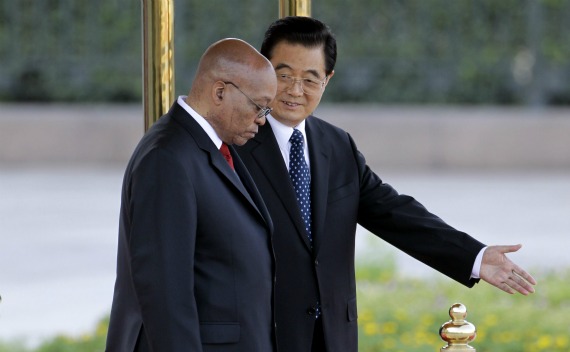China’s Influence: Waxing or Waning?
More on:

One of the significant unresolved questions surrounding Chinese foreign policy is whether China’s influence is expanding or diminishing. Is China a model for other countries? Does its economic clout give it sway in other arenas? Does its growing military prowess have the potential to bend others to its will?
In the past two weeks, China’s influence barometer has been fluctuating wildly. In Zambia, Presidential candidate Michael Sata campaigned largely on an anti-China platform, proclaiming “Zambia has become a province of China…the Chinese are the most unpopular people in the country because no one trusts them,” and won. Closer to home, Burma threw a wrench in China’s plans to populate the Irrawaddy with seven more dams, including the 6,000 megawatt Myitsone dam, when Burmese President Thein Sein announced the suspension of the dam until his term ends in April 2016. The dam would have flooded an area roughly the size of Singapore and provided energy primarily for China. The Chinese government was stunned at Burma’s betrayal. And of course, throughout much of Asia, China’s neighbors are forging new alliances and fortifying old ones to defend against a seemingly more assertive China. (That certainly sounds like influence…just not the kind Beijing wants to have.)
At the same time, the South African government led by President Zuma failed to provide the Dalai Lama with a visa to attend the 80th birthday party of his fellow Nobel Laureate Desmond Tutu, prompting an angry outcry from the Archbishop. In addition, my colleague Josh Kurlantzick has suggested that China’s influence in central and parts of Southeast Asia is expanding through Beijing’s programs to manage social instability. Although given the significant annual increases in numbers of protests in China, it’s not clear to me what they are teaching, exactly; and given the already authoritarian predilections of these states, China’s influence, while not negligible, is not terribly surprising. Finally, opening the newspaper on any given day, it is easy to get the impression that without Chinese investment, the entire world economy would be down under.
So, is China’s influence waxing or waning? The answer is that it depends. Relations between countries are forged at so many different levels among so many different actors; while influence may be felt in the economic sphere, for example, it may be non-existent on critical issues of security. China’s vast purchases of raw materials in Australia, which have contributed to an Australian economic boom, have certainly increased its influence on the Australian economy; when China sneezes, Australia runs for a handkerchief. Yet, the prime minister of Australia reportedly told Secretary of State Clinton that force might be necessary against China “if everything goes wrong.” Again, China has influence, but influencing the Australians to plan for the use of force against the mainland is not Beijing’s endgame.
We also need to consider influence in a variety of contexts. What is the time frame? What is the issue? Who is the intended target of the influence? What does the target have to gain? Influence in foreign policy is not only issue but also time specific. Prior to President Obama’s trip to China in November 2009, for example, he did not meet with the Dalai Lama in order to avoid offending Beijing. A few months after the trip, he met with the Dalai Lama and clearly annoyed the Chinese. China seems to have had influence before November but not after. What is that influence really worth in serious foreign policy terms?
“It depends” is rarely a satisfactory answer to anything. But sometimes, it is the right one. “It depends” is also an answer that will help keep us from becoming overly alarmist or overly sanguine. China’s “influence” in any case may be positive or it may be harmful—the devil is always in the details—and we need to pay close attention as we to try to parse out where China is going, what it will mean for the rest of world, and what we can do about it.
More on:
 Online Store
Online Store
